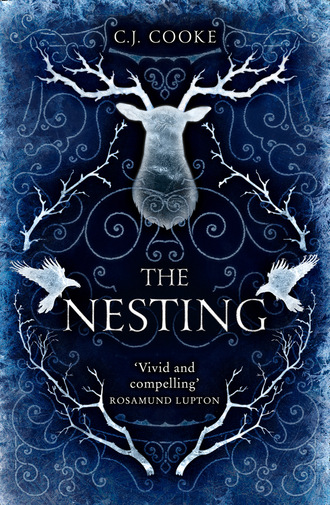‘How long is it for?’ Sophie’s friend whined.
Sophie mumbled a reply, but I didn’t hear, though her friend gasped.
‘You can’t go to Norway for that long!’ she said, horrified. ‘That’s ages.’
‘I know,’ Sophie said sadly, ‘but it’s a great job. Really well paid. All food and board taken care of, super gorgeous locale. They want someone to start right away …’
Now I was really interested. Free food and accommodation in Norway? Well paid? I could feel myself being drawn in – no, hauled in, by the throat – and there was a tingling sensation all over my body that I hadn’t experienced in a long, long time. Kind of like falling in love, only without the certainty that it’s going to end in tears and vile accusations.
When I was little, Mrs Corbett – my Year Four teacher, who didn’t get under my skin, but who showered me with love and the kind of smiles that made me stand a little taller – told me about serendipity. A happy accident, she said, orchestrated by the universe. She said we were all made of star dust – which I thought was gross at the time – so the oldest parts of our being would recognize when something was serendipitous. I told her that when I met her I had a big shiver all over, and she crouched down and said, ‘That is exactly what serendipity feels like, Lexi, sweetheart. Exactly that.’
‘You can’t go!’ Sophie’s friend hissed. ‘Look, I wasn’t going to say anything for another week or so but … I’m pregnant!’
Sophie gave a squeal and wrapped her arms around her friend. ‘Oh. My. Word. What?!’
Her friend was sniffling and giggling now and I rose a little higher in my seat to catch sight of the laptop screen for the job details.
‘When are you due?’ Sophie said, hugging her friend and rubbing her back.
‘February. I need you here, Soph. I was counting on you helping me out, especially since I’ve got this project to deliver by bloody Christmas. I wanted you to be my doula. Please? Look, whatever this job pays, I’ll double it.’
Sophie considered. ‘All right,’ she said, smiling. ‘Oh blimey, a baby, Seren?’
Seren. Like serendipity.
It was as though the universe was pointing a gigantic, god-like finger from parting clouds right at me, and a Charlton Heston-voice was booming, This job is meant for you, Lexi Ellis.
I had to get the details of that job. Not just the details – I had to get Sophie’s statement, her CV, and her references. After all, she was the one with the experience in nannying, not me. In one wild moment of crystalline clarity, I knew what I would have to do in order to get the job – I would have to pretend I was Sophie.
‘I’m going to get some lunch,’ Sophie announced. ‘Are you hungry? Well, you will be, won’t you? Now that you’re eating for two!’
Her friend – Seren – deliberated. I’d pulled out my phone at this point, hell-bent on getting a screenshot of the laptop screen before she put it away, but Seren was blocking my view, and just as she rose up out of her seat she closed the laptop lid. My heart sank.
Thanks, Universe. Thanks for toying with me.
‘Hold up,’ Seren called after Sophie. ‘I’m coming.’
Sophie glanced back at her bag and laptop, a worried look on her face. She was tall and slender, long auburn hair to her waist, and a belly top revealing a slender midriff. To my horror, she caught my eye.
‘Would you mind?’ she began, and I stared back at her, cow-eyed. ‘Would you mind watching my stuff while we head to the buffet carriage?’
‘Oh,’ I said, finding a sudden composure. ‘Not at all.’
She flashed an appreciative smile. ‘Thanks.’
The two of them headed off down the carriage chatting loudly, and I breathed a sigh of relief. I glanced around to check no one was looking before reaching an arm through the gap in the seat and lifting the lid of the laptop. It was probably password protected. Damn. Quickly I flipped it open and the screen whitened. To my relief, the PDF of the job application was there, right in front of me, and so I thrust my phone forward and took picture after picture of the screen. I scrolled up and down on the keypad, no longer really seeing what I was taking photos of, but snapping hastily at everything and anything to make sure I got it all.
‘Thank you so much!’
Sophie’s voice sounded, sending a javelin of fear right through me, and I sat back in my seat, sweat streaming down my back and my heart clanging in my chest. As Sophie and Seren tucked into their croissants and coffees I scrolled through my phone and zoomed in on the images I’d taken. Some were blurry, most were lopsided, but it didn’t matter. I’d got what I needed.
My name was now Sophie Hallerton, I had a brief CV detailing my nannying experience and email address for a reference, and a saccharine statement in florid prose about my passion for looking after children. In other words, I was set.
I set up an email account. Sophiehallerton1088@gmail.com. I downloaded the form and copied out the answers and Sophie’s responses. If there was one thing I was good at, or at least something I used to do all day long in my last job, it was completing forms and setting up email accounts. Finally, I sent the application off from my new email address.
As the train pulled into Birmingham New Street three hours later, my phone bleeped with an email.
To: sophiehallerton1088@gmail.com
From: maren.larsen@tfarchitecture.net
Subject: Re: job application
Dear Sophie
Many thanks for your application for the position of ‘Nanny’.
We would like to invite you to interview for this role as soon as possible.
Would you be available to meet with myself and Mr Faraday next Wednesday at 1 p.m.? The address is:
313 Rowan Gardens, London, NW3 5TD
We will contact the person(s) you have listed as employment references in the meantime, if that’s OK?
Kind regards
Maren Larsen
My heart leaped. I felt sick and excited at the same time, exactly the same feeling I had when I jumped off the top diving board at the swimming pool, or went on the Ferris wheel with the creaky carriages.
To: maren.larsen@tfarchitecture.net
From: sophiehallerton1088@gmail.com
Subject: Re: Re: job application
Hi Maren
Thank you for your email.
Yes, I’d be delighted to attend this interview.
Kind regards,
Sophie Hallerton
A reply swooped back within seconds – wonderful, see you then – and I leaned back in my seat, my nerves pinging with excitement and adrenalin. Sophie and Seren sat in front of me sucking croissant flakes from their fingers and discussing baby names and birth plans, the job application long forgotten.
Next Wednesday was exactly a week away. The rail pass expired at midnight that day, though David could easily cancel it before then once he worked out it was missing. If he did, I didn’t have enough money to buy another ticket. Come to think of it, I hadn’t enough money to book a place to stay until then.
Using the last of my phone’s battery, I dialled Meg.


A PLACE TO STAY
Now
Meg didn’t answer her phone.
I sat on the train, watching the platform fill up with people making their way to the exit. I tried Meg again, and again.
‘Aren’t you getting off, miss?’ a train conductor asked from the aisle.
‘Oh. Yes,’ I said, trying not to be weird and twitchy, as David had often accused me of being. I hoisted up my bag and saw him eyeing the contents. I stepped on to the platform and headed for the exit. Outside I spotted a café, and in a series of highly focused non-weird and non-twitchy movements, I ordered a coffee and parked myself at a table.
What happened next wasn’t ideal. First, my phone battery died, then the waitress came and told me they were closing in ten minutes. I realized with shock that it was almost six o’clock in the evening. This is the thing with depression, and particularly with anti-psychotics – your internal clock goes AWOL, as does your libido, hunger, balance, focus, sense of humour, and short-term memory. So I wandered around trying to forage for a phone charger, then caved and got back on the train to Newcastle, which was now full of drunk, red-faced blokes shouting about a football match. I found a seat as far away from them as possible and curled up in a ball, hoping they wouldn’t shout at me, which they did. And then, at York, the train broke down. Signal failure. We had to get off, were promised we’d be refunded. It was freezing cold, the platform was swarming with aggressive football fans, and I had nowhere to go.
I approached one of the police officers who had – serendipitously – appeared on the platform.
‘Excuse me,’ I said, and in my mind I was poised to tell them a story about losing my purse, and could they point me in the direction of a hostel? My mouth, however, had other ideas. ‘I’m homeless and I’ve nowhere to go and two months ago I tried to kill myself so will you help me please I’m so lonely,’ my mouth said, and I started to cry.
Within a minute I was being asked to get into the police car, and within ten minutes I was standing outside a women’s refuge.
The refuge had a big common area with sofas and a hand-painted mural of a forest across three walls, and a kitchen for us to eat together. The dorms were all full of women and children, but the lady in charge said I could spend the night on a sofa.
I ended up spending the week there. It felt nice, like a little community of bruised, terrified, and addicted women. Jill ran the place with a team of volunteers. Jill was large and had bright red hair piled on top of her head and she always wore a black vest top with a swishy black skirt with purple Dr. Martens. There was a massive garden out the back with deck chairs, and Jill told me every day to sit out there and ‘clear my mind’. A doctor visited and I told her I needed a repeat prescription of the medicine I’d been on. She frowned and suggested I try a lower dose of something that was apparently ‘less taxing’ on the brain. Another woman – a volunteer at a charity shop – came around with clothes, which was great as I literally had only the clothes on my back. I picked out a black trouser suit with a white shirt for my interview, and she found me some sensible shoes.
Wednesday came and I got on the train to London for the interview. I was super nervous, but Jill put some make-up on me and insisted that I look at myself in the mirror. I was surprised. My eyes always looked sallow, but she’d blotted out the dark circles with concealer and added mascara and a flick of kohl just above my eyelashes. A dab of bronzer made me look healthy, and on my lips she dabbed a demure coral lipstick which apparently made my eyes ‘pop’. I found this to be a rather distressing mental image, so Jill clarified: ‘It means your lovely brown eyes look like melted chocolate. OK?’ Melted chocolate can only ever be a pleasant thing.
I also washed my hair for the first time in weeks – months, maybe – and she used a hairdryer and scorching-hot tongs to bring it to life.
‘There you are, my lovely,’ she said, spritzing my hair with something called ‘gunk’. ‘Just like Penélope Cruz, you are.’
I’d expected the interview to be in some big, space-agey skyscraper, but instead the taxi dropped me outside a beautiful mansion in leafy Hampstead – close to the Freud Museum, as it happens. I’d often wondered if lying on a couch talking about my problems – or rather, my mother – would have done a better job of fixing me than medication, but then I figured that slathering myself in snake oil or burying a potato at the root of an oak tree on a full moon would have done a better job of fixing me than medication, so the answer was probably a resounding yes.
I walked up the garden path and pressed the buzzer outside the red door, which had a crescent of stained glass in every colour.
A heavy-set woman with cropped platinum-blonde hair opened the door. She looked like she was mid-fifties, a handsome face and an intelligent, penetrating look about her.
‘I’m here for the interview?’ I said softly. ‘I’m Lex— Sophie. My name is Sophie Hallerton.’
Damn. I’ll never remember to keep that one up. Sophie. I’m Sophie. Sophie. Sophie. Sophie.
‘Maren,’ the woman said, holding out a hand. I shook it. ‘Do come in.’
It became clear that the house wasn’t an architecture firm but a family home, with rustic wooden floors, sage green walls dotted with family photographs, an old rocking horse and a glass cabinet filled with pictures and cute ornaments in the spacious hallway. A staircase swept upwards, where a children’s programme was playing on a TV. Maren gestured for me to follow her through the hallway towards a large kitchen, which was a mixture of high-end design and country charm. An open-brick chimney breast was filled with a silver range cooker; in the centre of the room was an island with six white bar stools and an arrangement of baby-pink peonies. To my left, a pretty garden was visible through French doors: a weeping willow, a pond. The marble surfaces were pristine, but I could make out children’s drawings stuck to the doors of a double fridge freezer standing at the far end of the room. Whoever lived here clearly cared a lot about their family.
‘Can I get you anything to drink?’ Maren said, and I noticed a hint of an accent. Clipped, European. ‘Tea? Coffee?’
‘Just … a glass of water,’ I said. She took a glass from a cupboard and filled it at the fridge freezer’s water dispenser, then got one for herself.
‘Thanks,’ I said.
She gestured for me to take a seat at the kitchen island and did the same. This wasn’t how I expected the interview to go. I noticed she was wearing a floaty navy tunic with white linen trousers, and I suddenly felt overdressed.
‘Thank you very much for your application,’ she said. ‘We were very impressed by your experience. This is clearly a vocation for you.’
It took me a moment to deduce that this was a question. I nodded and gave what I hoped was a relaxed, vocational smile.
‘Oh, yes,’ I said. ‘Definitely a vocation.’
‘Wonderful that you have a nursing degree.’
‘Oh,’ I said. ‘Er, yes. I thought it might … come in handy one day.’
‘And a certificate in vegan cookery!’
I blinked. Was that on Sophie’s CV? I couldn’t remember. ‘Vegan cookery is something I’m very … vocational … about.’
‘Fantastic!’ she said, clapping her hands together. ‘I’m not vegan myself, though I am partial to red lentil tagine.’
‘Oh, yes,’ I said, unconvincingly. ‘Me too …’
‘Of course, Mr Faraday is vegan,’ she interjected, ‘and he intends his girls to be vegan, too.’ I gave a nervous laugh. Why hadn’t I noticed the bit about being a vegan chef? Maren glanced at her watch. ‘Speaking of which … Mr Faraday will be joining us shortly, but first I wanted to chat to you about … one or two matters that you should be aware of.’
She gave me a meaningful smile, and I felt acutely aware, now that I was here, that I hadn’t read the job description. It was a nannying job, and I’d assumed that meant looking after some children, or in other words lots of reading and painting and trips to the park. You see, I used to babysit regularly – albeit for my mum’s friends who were either too unconscious or preoccupied with partying to care for their kids – and I’d toyed with the idea of training to become a primary school teacher. None of my babysitting involved vegan cookery, however, or indeed anything that might require a nursing degree, with the exception of the time little Bobby Fitzmaurice cracked his head open on a bong. Duct tape and toilet roll sorted him right out.
‘Mrs Faraday – Aurelia – sadly passed away a few months ago,’ Maren said slowly. ‘Naturally the children are still getting used to the situation – Gaia in particular, given that she’s a little older … and we are trying everything to make life as easy as possible …’
‘I’m very sorry,’ I said, the gravity of her words reaching me like physical blows.
‘Gaia and Coco have a nanny here,’ Maren continued, ‘but sadly she is unable to join us in Norway during the build.’
I felt a huge amount of relief at the mention of the children’s names. This was another detail I’d overlooked. Gaia and Coco. What pretty names. It would have been disastrous if I hadn’t known their names. Poor girls, to have lost their mother so young.
‘The build?’ I asked.
‘Tom and Aurelia bought land in Norway. They intended to build a holiday home, but during the construction period, Aurelia … passed.’ I saw her pale eyes moisten, and I realized she must have been close to this woman. I’d spotted a photo on top of the glass cabinet in the hallway of a woman with long, wheat-blonde hair grinning at the camera with an arm wrapped around a little girl of about four. Was that Aurelia? It must be.
‘Aurelia adored her girls,’ Maren continued in a sad voice. ‘They meant everything to her. Part of the reason for the summer home was so that she could cultivate friluftsliv—’
‘Oh, friluftsliv,’ I said, because of course.
‘—this is the Norwegian itch for the outdoors,’ Maren explained. ‘Aurelia wished to give her daughters the kind of summers that she had enjoyed as a child, always out in nature, and connect them to their heritage …’ She wanted to say more but suddenly couldn’t, her words winnowed by grief. She reached into her pocket for a tissue and dabbed her eyes. ‘And now,’ she said in a stronger voice, clearing her throat, ‘the build must recommence, but Tom is anxious to be on site for its duration and requires the children and nanny to be with him. I’m Tom’s housekeeper, and I’ll also be there.’ She stuffed the hankie up her sleeve and turned to me with shining eyes, the memory of Aurelia evidently filed away in her mind so that normal service could resume.
‘The job will require you to be with the children on site on a full-time basis,’ she said, ‘at least until March. Is that a problem?’ Her eyes searched my fingers for any sign of a ring. ‘No … partner who’ll want you home for Christmas?’
‘Oh,’ I said. ‘No. Quite the opposite, in fact.’
She frowned at that, but something in her mind told her that this was the answer she wanted and she moved on. ‘Well, your reference was glowing, of course. Tom only sent the application pack to a selection of trusted associates – we don’t use recruitment agencies or anything like that – so we were delighted when Verity championed you.’
She was beaming now, and my face contorted into a rictus grin while my mind did somersaults. Verity?
‘Oh, Verity,’ I said lightly. ‘She’s … that’s so kind …’
Maren batted her hand in the air as though I was being modest, not clueless. ‘Of course she championed you. And what happened in Belgium …’
I gave a nervous giggle and eyed the door. What happened in Belgium? I wanted to shriek. It was abundantly, sharply clear now that I was way out of my depth. It was wrong to lie to a family who’d lost their mother. It was wrong to parade as something that I wasn’t, despite how desperate I was. I placed a foot on the floor and lifted my hips off the chair, preparing myself to sprint the hell out of there.
‘Hello?’ a man’s voice called. I looked up and saw a figure in the French doors, silhouetted by celestial afternoon sunlight that was swelling in the garden. A tall, lean man in a smart navy polo shirt and chinos, dark, tousled hair flecked with silver, and a hint of beard. A slightly more upmarket, skinnier Colin Farrell, with rimless glasses and overlapping front teeth. He marched across the room towards me and extended a hand. A gold wedding band flashed in the light. ‘Tom Faraday,’ he said, grinning. ‘You must be Sophie. A pleasure to meet you.’
‘A pleasure to meet you too,’ I said.
He raised his eyebrows. ‘Is that a Geordie accent?’
I hesitated. ‘Yes?’
He glanced at Maren. ‘Spend a lot of time in the north, did you?’
‘I … looked after a child from the north,’ my mouth said, while my brain tried to keep up. ‘She was homesick and so I adopted her accent to make her … less homesick.’ Phew. My excuse seemed to make sense. But I would have to curb my accent. Now that I thought about it, Sophie hadn’t sounded particularly northern.
A warm smile. ‘Well, that’s very kind of you. How long have you been nannying?’
‘Ten years,’ I blurted out. Lies, lies, lies, said my brain.
I was sure Maren would launch into questions about the specifics of this – who did I nanny, and where – but she merely smiled and said, ‘And if you had to describe your nannying style, what would you say?’
I tried to make up another lie, but a squeak came out.
I stood up. ‘Sorry,’ I said. ‘But is there a loo I could use?’
‘Certainly,’ Tom said, spinning around to his left. ‘Straight ahead, past the fridge. Oh, on second thoughts, best not as it’s still blocked. Kids and their toys … Use the one upstairs. Second door on the left.’
‘Thanks.’
I headed quickly upstairs and locked the toilet door behind me, then sat down with my head between my knees and groaned. What was I doing? What. Was. I. Doing?
I spent a few moments taking deep breaths and planning my next moves. I would go back downstairs and tell them that I was very sorry but I couldn’t do it after all. My friend was pregnant – or Sophie’s friend was pregnant – and I had to be around for her. Or Plan B: I’d tiptoe back down the stairs, open the front door, and run the hell out of there.
I was still weighing up Plan A and Plan B when I opened the door to find a small child staring up at me. She had white-blonde hair tied back in a loose plait, a pink gingham dress with a strap hanging off one shoulder, both arms behind her back. Round green eyes shone through turquoise spectacles, and I noticed that someone had drawn pictures all over her hands and bare legs in red felt-tip. She surveyed me curiously.
‘Are you my new nanny?’ she said.
‘I’m … I’m Sophie,’ I said.
It sickened me to lie to a child, I swear, but I could hear Tom’s footsteps on the stairs.
‘I’m Gaia,’ she said. ‘I’m six. How old are you?’
‘I’m twenty-eight.’
‘My mumma’s in heaven,’ she said.
This was a sucker punch to my heart. ‘I’m so sorry,’ I said.
‘This is my teddy,’ she said, producing an old teddy from behind her back with floppy limbs, a tweed waistcoat, and a missing eye. ‘He’s not feeling very well today.’
It was clear that there would be no sprinting out the front door, so I crouched down in front of her and said, ‘What’s your teddy’s name?’
‘Louis.’
‘And why’s Louis not feeling very well?’
‘He’s just feeling a bit sad. And he has a sore tummy.’
‘Ah,’ Tom said, reaching the top of the stairs. ‘I see you’ve met Gaia and Louis.’ He winked at Gaia. ‘How are you doing, pudding?’
‘Daddy!’ She ran to him with her arms out, wrapping them around his legs and burying her face in his thigh. ‘Is this my new nanny?’ she said, glancing back at me.
Tom scooped her up and grinned at me. ‘Well, that depends.’
‘On what?’
‘Shall we introduce Sophie to Coco?’
Tom gestured for me to follow him into one of the bedrooms and I opened my mouth to say something along the lines of I have to go now, but somehow I found myself in the sweetest child’s bedroom I’d ever seen, more a mini-apartment than a bedroom, with thick cream carpet, powder blue velvet curtains, and peach blossom walls, a crescent moon made out of twinkling LED lights, a miniature hot air balloon as a chandelier, and enough toys to fill a crèche, including a plush, twelve-foot toy giraffe. The name ‘Coco’ was hand-painted in fancy gold lettering across a wall, and when I looked over at the white sleigh cot I saw a little girl in a Babygro hanging on to the bars, her legs wobbling as she looked up and threw me a wet smile.




